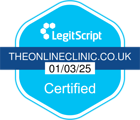Dermatitis
What is dermatitis?
Dermatitis means inflammation of the skin. It is a common condition of which there are several types and many different causes. Different types of dermatitis include irritant or allergic contact dermatitis (sometimes called contact eczema), seborrhoeic dermatitis, and stasis dermatitis. Dermatitis usually presents as itchy, red, inflamed patches of skin that can become blistered, cracked, scaly and flaky, and ooze fluid. Additionally, with seborrhoeic dermatitis, itchy, greasy, white-yellow scales appear in affected areas, while open sores and skin thickening may occur with stasis dermatitis. Dermatitis can be bothersome but it is not contagious.
Can I get treatment online?
The Online Clinic can prescribe a range of treatments for dermatitis but we need to take a few salient medical details first so that we can work out what would be the appropriate treatment for you. Simply click on the free assessment button to begin.
What causes dermatitis?
The different types of dermatitis have different causes. Irritant dermatitis is caused by contact with skin-irritating products, such as detergents, soaps and chemicals, while allergic contact dermatitis results from exposure to a product to which you have developed an allergy (i.e. the product causes your body's immune system to react to it), e.g. metal in costume jewellery, perfumes, cosmetics, and plants. Yeast living on the skin is thought to play a role in seborrhoeic dermatitis that occurs on the body's oily areas or on the scalp (known as dandruff or ‘cradle cap’). Stasis dermatitis is the result of problems with your blood circulation that causes fluid accumulation in the lower legs.
How is dermatitis treated?
There are three main ways of treating dermatitis: avoiding the things that cause your condition to worsen, treating the symptoms when they appear, and routinely caring for your skin.
For contact dermatitis, once identified, the irritants and allergens to which you are sensitive should be avoided. If contact is unavoidable (as with soaps), then skin protectors, such as gloves and emollients, are useful. Warm baths, moisturisers and emollients keep the skin moist, reduce the redness and itching, soothe the skin, and promote skin repair. Skin inflammation can be treated with topical corticosteroids and medicines that dampen your immune reaction (tacrolimus ointment or pimecrolimus cream). For severe conditions, corticosteroid tablets and stronger immunosuppressant medicines, e.g. azathioprine, may be prescribed but we do not do this online. An oral antihistamine may be prescribed for intense itching and an antibiotic for any subsequent skin infection.
Scalp seborrhoeic dermatitis is treated with medicated shampoos, such as those containing zinc pyrithione, while other body areas may benefit from mild corticosteroid creams. Often treatment also involves an antifungal agent such as ketoconazole. Oral ketoconazole can no longer be prescribed because of the liver problems that it caused.
Support stockings and resting with your legs elevated is recommended to reduce leg swelling from stasis dermatitis. Additionally, the medical condition causing the swelling needs to be controlled and infected open sores may necessitate a course of antibiotics.
When should a doctor be contacted?
Your doctor should be able to identify whether you have dermatitis and its type, or refer you to a dermatologist (skin specialist). Contact your doctor if you need treatment advice, or if your condition is severe, does not improve with treatment, or appears to be infected. For repeat prescriptions, The Online Clinic can help.
How can I reduce the risk of dermatitis?
Dermatitis mostly occurs in individuals with sensitive skin, and risk is therefore minimised by irritant or allergen avoidance. However, using a mild soap or soap substitute, moisturising the skin with unperfumed products after bathing, wearing loose, cotton clothing, and avoiding dry environments are preventative measures reducing inflammation and itching of the skin. Once cleared, scalp dermatitis can be controlled by continuing weekly with an antifungal shampoo.
GMC registration number: 4524038

Date: 3 November 2023
Next review: 2 November 2025
All UK registered doctors can have their registration checked on
The Medical Register at the GMC website.
Related Pages
Skin and Nails News
NICE Examines New Psoriasis Treatment
NICE Begins Approval Process for New Treatment for Severe Psoriasis Draft guidelines that back the use of Almirall's new product Skilarence, for the treatment of moderate or severe plaque psoriasis by the National Health Service in the United Kingdom, have been issued by the National Institute…
Read full article >Duac Gel in Stock
After being out of stock for a while owing to a manufacturing problem, we are pleased to report that Duac Once Daily Gel is back in stock. Duac is a popular prescription acne treatment that contains Benzoyl Peroxide and Clindamycin. If you have already been approved for this product through our…
Read full article >Trimovate Finally Back in Stock
We are delighted to announce that Trimovate is back in stock and available for next day delivery. This product is an almost indispensable medication, so it is good to have it back in stock after a manufacturing problem that has gone on for well over a year. Trimovate is one of the few products…
Read full article >







